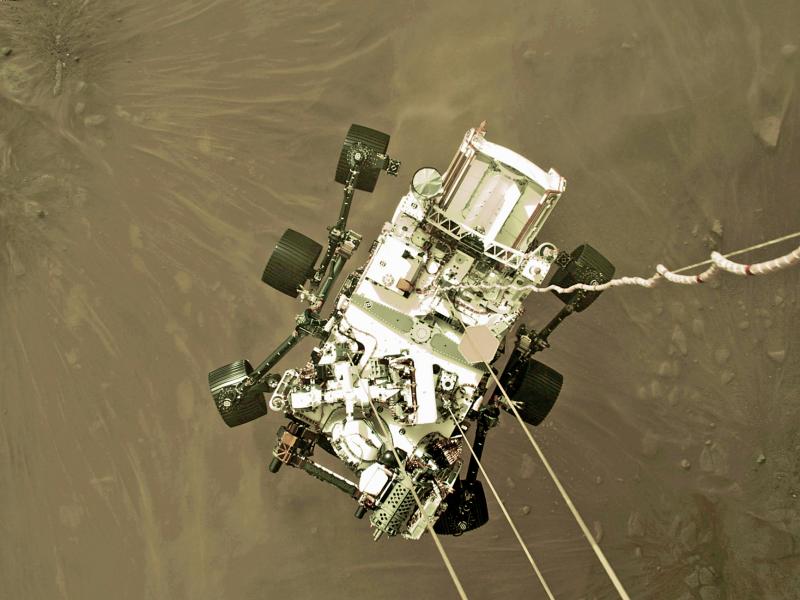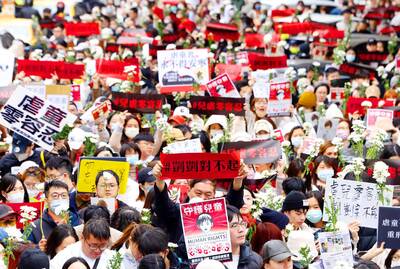When NASA’s Perseverance rover touched down on the surface of Mars on Thursday after a seven-month journey, a Taiwan-born engineer was preparing to guide its first movements on the Red Planet.
Yen Cheng (嚴正), a 61-year-old graduate of National Tsing Hua University and a 20-year veteran at NASA’s Jet Propulsion Laboratory, is taking part in his fourth Mars exploration mission with the agency’s Robot Interfaces and Visualization team, this time as its leader.
Yen in a media interview described his expectations for the next few months as “living on Earth in Mars time.”

Photo: Reuters/NASA/JPL-Caltech
As nighttime temperatures on Mars can drop to minus-80°C, the rover must spend those periods heating itself, while conducting research during the day, he said.
Yen and his team would use the downtime to prepare the code that would guide the rover’s movements the next day, he said.
However, as a Martian day is about 40 minutes longer than an Earth day, the time difference results in a shifting work schedule.
“Today my shift started at 2pm. Next week it will start at 10pm,” Yen said.
He said that piloting the 1-tonne rover is nothing like driving a remote-controlled vehicle, despite expectations to the contrary.
As there is no GPS on Mars, Yen and his team had to design custom navigation software for the rover, using technologies such as 3D visualization and virtual and augmented reality.
These efforts, multiplied across other teams contributing to the mission, mean that every meter the rover covers on Mars is the product of “decades of work by countless people,” he said.
One of the main missions of the Perseverance rover is to search for signs of ancient life on the Red Planet.
Asked if NASA has guidelines on what to do if the rover encounters alien life, Yen said it did not, but joked that his first instinct would be to take a picture.
However, NASA followed strict procedures to prevent Earth organisms from hitching a ride to Mars, due to their potential to corrupt scientific research and result in a false discovery of life on the Red Planet.
Asked how long it would take before a human mission could reach Mars, Yen said he believes that children born this year could see it during their lifetime, adding that the technology needed to launch a human mission to Mars already exists.
It is just a matter of investing the money, which would be “hundreds of times” more than the US$2.7 billion price tag for the Perseverance mission, he added.
While the goal remains distant, Yen said he was amazed by the progress that has been achieved during his own time at NASA, including the discovery that liquid water once existed on Mars and now searching for evidence of life on the Red Planet.
Yen advised young Taiwanese interested in astronautics not to be afraid to pursue their dreams, citing his own mid-career decision to leave a professorship for an opportunity at NASA.

Taiwan yesterday condemned the recent increase in Chinese coast guard-escorted fishing vessels operating illegally in waters around the Pratas Islands (Dongsha Islands, 東沙群島) in the South China Sea. Unusually large groupings of Chinese fishing vessels began to appear around the islands on Feb. 15, when at least six motherships and 29 smaller boats were sighted, the Coast Guard Administration (CGA) said in a news release. While CGA vessels were dispatched to expel the Chinese boats, Chinese coast guard ships trespassed into Taiwan’s restricted waters and unsuccessfully attempted to interfere, the CGA said. Due to the provocation, the CGA initiated an operation to increase

A crowd of over 200 people gathered outside the Taipei District Court as two sisters indicted for abusing a 1-year-old boy to death attended a preliminary hearing in the case yesterday afternoon. The crowd held up signs and chanted slogans calling for aggravated penalties in child abuse cases and asking for no bail and “capital punishment.” They also held white flowers in memory of the boy, nicknamed Kai Kai (剴剴), who was allegedly tortured to death by the sisters in December 2023. The boy died four months after being placed in full-time foster care with the

The Shanlan Express (山嵐號), or “Mountain Mist Express,” is scheduled to launch on April 19 as part of the centennial celebration of the inauguration of the Taitung Line. The tourism express train was renovated from the Taiwan Railway Corp’s EMU500 commuter trains. It has four carriages and a seating capacity of 60 passengers. Lion Travel is arranging railway tours for the express service. Several news outlets were invited to experience the pilot tour on the new express train service, which is to operate between Hualien Railway Station and Chihshang (池上) Railway Station in Taitung County. It would also be the first tourism service

The Chinese military has boosted its capability to fight at a high tempo using the element of surprise and new technology, the Ministry of National Defense said in the Quadrennial Defense Review (QDR) published on Monday last week. The ministry highlighted Chinese People’s Liberation Army (PLA) developments showing significant changes in Beijing’s strategy for war on Taiwan. The PLA has made significant headway in building capabilities for all-weather, multi-domain intelligence, surveillance, operational control and a joint air-sea blockade against Taiwan’s lines of communication, it said. The PLA has also improved its capabilities in direct amphibious assault operations aimed at seizing strategically important beaches,